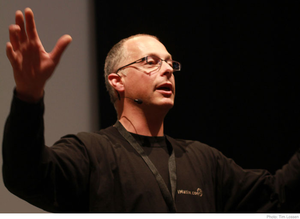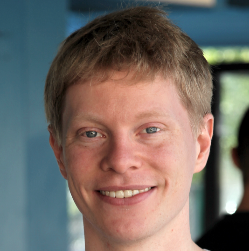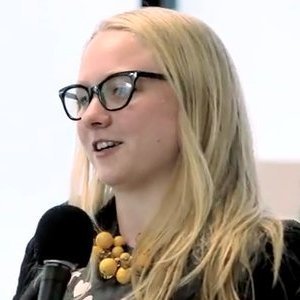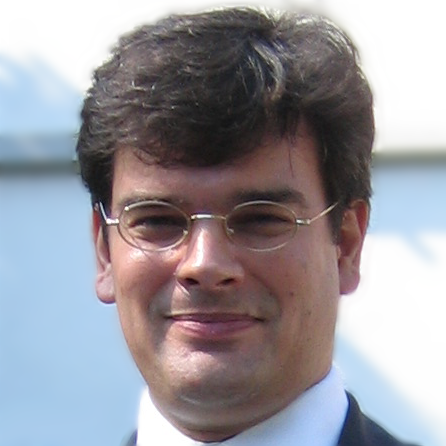Some days ago we have finished the last round of the EuroPython Financial Assistance programme. Over the last months the EuroPython organization team received 109 applications for financial grants. In three rounds (March - May) we granted a total sum of about 22.000 € to 67 applicants (63 accepted the grant). We granted two third of all grants to women (a total of 43 women are supported to visit EuroPython). We received grant applications from 34 different countries including USA, Brasil, Uganda, India, Pakistan and many countries from the EU.
Announcing Pieter Hintjens as EuroPython keynote speaker
We are pleased to announce that Pieter Hintjens will give a keynote speech at EuroPython 2014.
Our decentralized future
Pieter will talk about the urgent push towards a decentralized future. As founder of the ZeroMQ community, he will explain the vision, design and reality of distributed software systems. He’ll explain his view on the community itself, also a highly decentralized “Living System”, as Hintjens calls it. Finally he’ll talk about edgenet, a model for a decentralized Internet.
About Pieter Hintjens
Pieter Hintjens is a writer, programmer and thinker who has spent decades building large software systems and on-line communities, which he describes as “Living Systems”. He is an expert in distributed computing, having written many protocols and distributed software systems. He founded the ZeroMQ free software project in 2007, and in 2013 launched the edgenet project to build a fully secure, anonymous peer-to-peer Internet. He is the author of “ZeroMQ - Messaging for Many Applications” (O'Reilly), “Code Connected”, and “Culture and Empire: Digital Revolution”. His blog is at hintjens.com.

Featured training: Deploying and managing FreeBSD jails with mr.awsome, Fabric and Ansible
The training “Deploying and managing FreeBSD jails with mr.awsome, Fabric and Ansible” will be given by Tom Lazar.
FreeBSD jails provide a light-weight but powerful and secure way to virtualise services. However, the *BSD world has sort of stood on the side lines as the recent advances in systems deployment have developed. I.e. while vagrant, puppet, chef, ansible etc. have gained a great deal of acceptance in the Linux world, they often only consider BSD as an afterthought, which is a shame.
Well, mr.awsome has changed this! With its declarative provisioning approach you simply define a jail host and its jails and mr.awsome will go about and make it so.
Configuring a jail then simply becomes a matter of applying one or more ansible playbooks to it and maintenance operations such as performing updates, backups, managing services etc. that don’t quite fit the declarative approach of ansible can then easily be applied using Fabric - all powered by a single, canonical configuration!
By separating provisioning from declarative and imperative configuration each area becomes much more concise and clean.
Having great Python tools for each of these areas allows mr.awsome to tie them together on API level to provide a seemless, powerful solution that becomes greater than the sum of its parts.
FreeBSD jails provide a light-weight but powerful and secure way to virtualise services. The combination of mr.awsome (provisioning), ansible (declarative configuration) and Fabric (imperative configuration and maintenance) allow you to manage them elegantly, combining the best of each approach.
Tom Lazar is a freelance web developer based in Berlin. Tom is fluent in Python and Pyramid, prefers FreeBSD and is addicted to AngularJS. He is co-funder of pyfidelity.
Note: the previously announced training “RESTful services with pyramid and cornice” will not take place and is replaced with the training above - sorry for the confusion.

EuroPython sponsors will 30% off of PyData sponsorships
Changing the way scientists, engineers, and analysts perceive big data
PyData Berlin is being held in conjunction with Euro Python Sprints, 25 - 27 July. The three-day event is an opportunity for Python enthusiasts to share ideas and learn from each other how to apply the language and tools to meet the challenges of of data management, processing, analytics, and visualization. Tutorials will take place Friday, 25 July and the main conference sessions will be held Saturday, 26 July and Sunday, 27 July.
PyData is a three-day event where data science professionals, in both academia and enterprise, come together to discuss the challenges and management of data using Python. The community-led conferences are dedicated to providing a place for Python enthusiasts to share ideas and learn from each other, especially with respect to topics of data analytics, processing and visualization.
In 2 years PyData has grown from a workshop in Mountain View, CA, attended by 40 people, to 4 conferences a year with a total attendance of over 1,500. During this time, sold-out crowds in Santa Clara, Boston, New York City and London have participated in PyData tutorials, workshops and talks presented by prominent individuals in the Python data science community.
PyData Berlin 2014 will take place at the BCC, 25-27 July, in partnership with EuroPython.
ALL SPONSORS OF EUROPYTHON WILL RECEIVE 30% OFF OF PYDATA SPONSORSHIPS.
Sponsoring information
Featured talk "Supercharge your development environment using Docker"
The talk “Supercharge your development environment using Docker” will be given by Deni Bertovic.
Docker is an open-source engine that automates the deployment of any application as a lightweight, portable, self-sufficient container that will run virtually anywhere.
Docker containers can encapsulate any payload, and will run consistently on and between virtually any server. The same container that a developer builds and tests on a laptop will run at scale, in production*, on VMs, bare-metal servers, OpenStack clusters, public instances, or combinations of the above.
The idea of this talk is to convey how important it is that we have our development environment as close to production as possible. That means setting up all those various services on your laptop/workstation.
Deni Bertovic will show to utilize light weight lxc containers. Using docker, and make your development process much more straightforward. How to share container images among your development team and be sure that everyone is running the exact same stack. Do all this without hogging too many resources, without the need for complex provisioning scripts and management systems. And above all else, how to do it fast!
Deni Bertovic is a Software Engineer frfrom Zagreb/Croatia, currently focusing mainly on Python but he is also fluent with Clojure, Haskell and other functional programming languages in general. He works as system administrator and Devop with a special interest in virtualization and automating stuff. Apart from that he is happily coding away at goodcode.io.

Featured talk "Elasticsearch from the bottom up"
The talk “Elasticsearch from the bottom up" will be given by ”Alex Brasetvik“.
Modern web applications, content management applications etc. can require nowadays a modern and scalable search infrastructure. Elasticsearch is a search engine (on top of Lucence) that provides an excellent functionality for building search applications with an easy approachable data model and a JSON-based query language.
Alex will teach you about Elasticsearch and Lucene’s architecture and give you tidbits of highly relevant information for the real world without having to plunge into academic information retrieval tomes.
While Elasticsearch makes Lucene easily available in a distributed setting, it helps to have some knowledge about the underlying algorithms and data structures. Understanding how these data structures are used makes implementing search easier. Knowing how the indexes are built helps you keep things reliably performant.
Alex Brasetvik is a founder and senior software engineer at Found AS - a company whose primary product is a hosted Elasticsearch service. He has spent the past eight years on problem solving and solutions related to search, focusing on Elasticsearch in the last three years.

Featured talk "The Sorry State of SSL"
The talk “The Sorry State of SSL" will be given by Hynek Schlawack.
TLS is the best technology we have for securing our communications. It comes with many sharp edges though. This talk tries to jumpstart a rough understanding and these links should help you to complete the picture.
Hynek Schlawack works as software and infrastructure engineer for the Potsdam-based hosting provider Variomedia. At EuroPython 2013 in Florence, Hynek gave a well recognized talk about ”Solid Python Deployments for Everbody“. He also belongs to the Python core developer team.

Featured talk "For lack of a better name(server): DNS Explained"
The talk “For lack of a better name(server): DNS Explained” will be given by Lynn Root.
The Domain Name Server (DNS) system became a complex and hard to understand component of the internet. Lynn Root will explain in her talk how DNS works and how to communicate with DNS (through Python), she will cover client-side and server-side security issues and finally demo how to setup a working DNS server using Python and Twisted within 10 minutes.
Lynn Root works as a Partner Engineer for Spotify, she is founder of the PyLadies in San Francisco and board member of the Python Software Foundation (PSF).

Google Women in Tech Conference and Travel grants
They write:
As part of Google’s ongoing commitment to encourage women to excel in computing and technology, we are pleased to offer Women in Tech Travel and Conference Grants for EuroPython 2014 conference.
Overview
They are offering the winners:
- Free registration for the conference
- Up to 1000 EUR towards travel costs (to be paid after the conference)
To be eligible for a conference grant, the candidate must:
- Be a female working in or studying Computer Science, Computer Engineering, or technical field related to the conference subject
- Have a strong academic background with demonstrated leadership ability
- Attend the core days of the main conference
How To Apply
To apply, please submit this form by the 23th June deadline.
Winners and claim process
All applicants will be notified of the outcome of their application by email, approximately 3–4 weeks prior to the event. If you are selected, you will receive additional information on how to register for the conference and how to receive your travel grant.
Featured training: Iterators, Generators and Decorators
The training “Iterators, Generators and Decorators” will be given by Mike Müller.
Mike’s tutorial is a systematic introduction to the topics iterators, generators and decorators. It covers all relevant information with a focus on practical applications for common tasks. Attendees will learn how iterators, generators and decorators work and how to write better and more efficient programs with them. If you are new to these topics or tried but got confused about functions that return functions that return functions, this tutorial will help you to understand the how and the why.
Mike Müller is the EuroPython 2014 chair and also hosted the PyCon DE 2011 and 2012. He is originator and lead organizer of EuroSciPy 2008 and 2009, Chair Board Python Software Verband e.V. In addition he works Python Trainer and CEO of Python Academy GmbH & Co. KG. and tought Python to thousands of people over the last ten years.


